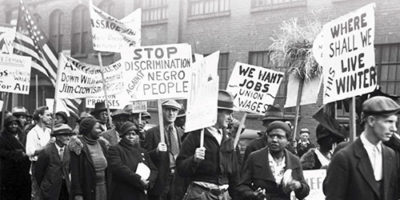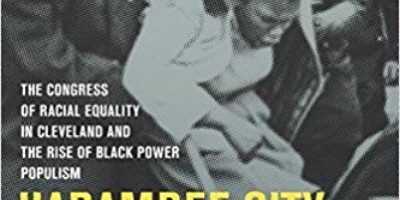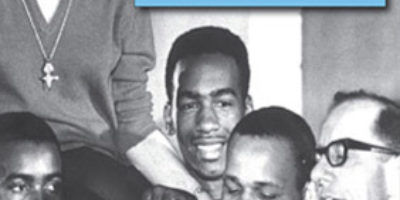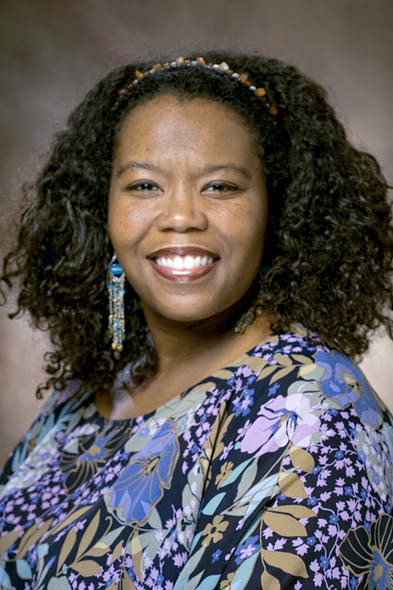Dec 07
The Black Freedom Struggle and the Strange Career of Jim Crow in the Midwest



Description
The Strange Career of the Jim Crow Midwest reveals the many faces of white racism. The face of employment discrimination was unmasked by the March on Washington Movement in Detroit’s auto plants in the 1940s. The face of killer cops was revealed by Fred Hampton and the Black Panthers and by Cha Cha Jimenez and the Young Lords in Chicago. The face of religious discrimination was exposed by Reverend Albert Cleage and Black Christian Nationalism in Detroit. The face of cultural imperialism was exposed by the Black Arts Renaissance from Detroit to Chicago. And the faces of housing and employment discrimination were protested by the NAACP in Milwaukee.
Speakers
-

Keona Ervin
University of Missouri
St. Louis native Keona K. Ervin is Assistant Professor of African-American History and Faculty Affiliate in the Department of Black Studies at the University of Missouri-Columbia. She earned her B.A. from Duke University with a double major in History (with honors) and African and African American Studies. She completed doctoral study at Washington University in St. Louis where she earned a Ph.D. in History. Prior to joining the MU faculty, Ervin was Consortium for Faculty Diversity Post-Doctoral Fellow and Lecturer in Gender, Sexuality, and Women's Studies and History at Bowdoin College in Brunswick, Maine and Assistant Professor of History and Africana Studies at Luther College in Decorah, Iowa.
Ervin completed her book, Gateway to Equality: Black Women and the Struggle for Economic Justice in St. Louis, published by the University of Kentucky Press as a title in the Civil Rights and the Struggle for Black Equality in the Twentieth Century series edited by Steven F. Lawson and Cynthia G. Fleming. She is a Center for Missouri Studies Faculty Fellow at the State Historical Society of Missouri. A recipient of the Career Enhancement Fellowship from the Woodrow Wilson National Fellowship Foundation (2015), and Arts and Sciences Faculty Fellowship from the University of Missouri-Columbia (2015), and the Huggins-Quarles Dissertation Award from the Organization of American Historians (2008), she has published in International Labor and Working-Class History and the Journal of Civil and Human Rights. She is also the author of an article in Souls: A Critical Journal of Black Politics, Culture, and Society. She is currently working on two new projects, one on the history of black women and the U.S. labor movement, and the other on working-class organization and black radical politics in the late twentieth century.
With State Historical Society of Missouri executive director Gary Kremer, Ervin is directing a new lecture series, The African-American Experience in Missouri, which brings a host of scholars and subject-matter experts to campus to address black historical experiences from the earliest period of statehood to the present. From 2016-2019, Ervin will serve on the Board of Directors of the Labor and Working-Class History Association.
-

Nishani Frazier
Miami University
Dr. Nishani Frazier is an Associate Professor of History at Miami University. She previously held positions as Associate Curator at Western Reserve Historical Society, Assistant to the Director of the Martin Luther King, Jr. Library and Archives in Atlanta, and personal assistant for Dr. John Hope Franklin during his term as chair of President Bill Clinton’s advisory board on “One America.” Her research interests include 1960s freedom movements, black internationalism, oral history, food, and biography. Her book, Harambee City: The Congress of Racial Equality in Cleveland and the Rise of Black Power Populism was published in 2017. She is also the author of “To Die For the People: Prophecy and Death in the Rhetoric of Martin Luther King, Malcolm X, and Fred Hampton,” “Building a Black Nation: CORE, Black Power, and the Community Development Corporation Movement,” and “A McDonald’s That Reflects the Soul of a People: McDonald’s Corporation, Operation Black Unity, Hough Area Development Corporation, and the Black Economic Empowerment”. In 2003 she edited, along with Manning Marable and John McMillian, Freedom on My Mind: The Columbia Documentary History of the African American Experience.
-

Patrick Jones
University of Nebraska, Lincoln
Patrick Jones was born in Baltimore, Maryland, and grew up in Cleveland, Ohio. He earned his B.A. in "American History, Politics and Society" from Kenyon College in 1993 and his Ph.D. in modern U.S. History and African American Studies from the University of Wisconsin-Madison in 2002. Jones researches, writes and teaches about the civil rights/Black Power era, America in the 1960s, race relations, urban inequality, social movements, electoral politics, African American experience in the "Jazz Age," and post-WWII American popular culture. Harvard University published his award-winning book, The Selma of the North: Civil Rights Insurgency in Milwaukee, in 2009. Tim Tyson called the book "...a riveting new story of the civil rights movement in America, a tale on par with Selma, Birmingham, and Montgomery in its power and importance" and Jeanne Theoharis has written, "The Selma of the North provides a devastating rebuttal of many of the conventional narratives of the civil rights movement." Jones is currently editing a collection of essays that explore the relationship(s) of music to the civil rights and Black Power era and working on a new monograph that looks at the contested meanings of civil rights and Black Power in Cleveland. He is guest-editing an upcoming issue of The Magazine of History on the black freedom movement in the urban North and also collects oral histories with local people about their experiences in the 1960s.